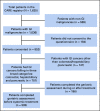Differences in Pretreatment Frailty Across Gastrointestinal Cancers in Older Adults: Results From the Cancer and Aging Resilience Evaluation Registry
- PMID: 36075013
- PMCID: PMC9653204
- DOI: 10.1200/OP.22.00270
Differences in Pretreatment Frailty Across Gastrointestinal Cancers in Older Adults: Results From the Cancer and Aging Resilience Evaluation Registry
Abstract
Purpose: Frailty predicts poor outcomes in older adults with cancer, but how it differs between different cancer types is unknown. We examined differences in pretreatment frailty between colorectal (CRC), pancreatic, and hepatobiliary cancers.
Methods: We included older adults age 60 years or older with the above cancer types enrolled in the Cancer and Aging Resilience Evaluation registry. Frailty was defined using a 44-item Cancer and Aging Resilience Evaluation frailty index constructed on the basis of the principles of deficit accumulation (including several geriatric assessment impairments encompassing malnutrition, functional status, comorbidities, anxiety, depression, cognitive complaints, health-related quality of life, falls, ability to walk one block, interference in social activities, and polypharmacy). Multivariable logistic regression models were used to examine the adjusted odds ratio (aOR) of frailty between cancer types.
Results: A total of 505 patients were included (mean age 70 years, 59% male): 211 (41.8%) CRC, 178 (35.2%)pancreatic cancer, and 116 (23.0%) hepatobiliary cancer. Patients with pancreatic cancer had the highest prevalence of frailty (23.3% CRC, 40.6% pancreatic, 34.3% hepatobiliary; P = .001). Both pancreatic (aOR, 2.18; 95% CI, 1.38 to 3.45), and hepatobiliary cancer (aOR, 1.73; 95% CI, 1.03 to 2.93) were independently associated with higher odds of frailty relative to CRC. Frailty was driven by higher rates of malnutrition and instrumental activities of daily living impairments in patients with pancreatic cancer and higher number of comorbidities in patients with hepatobiliary cancer.
Conclusion: Older adults with pancreatic and hepatobiliary cancers are at high-risk of pretreatment frailty. Early interventions to improve nutritional and functional status and optimization of comorbidities may help improve outcomes.
Conflict of interest statement
Figures



References
-
- Pilleron S, Sarfati D, Janssen-Heijnen M, et al. : Global cancer incidence in older adults, 2012 and 2035: A population-based study. Int J Cancer 144:49-58, 2019 - PubMed
-
- Brenner H, Kloor M, Pox CP: Colorectal cancer. Lancet 383:1490-1502, 2014 - PubMed
-
- Hartke J, Johnson M, Ghabril M: The diagnosis and treatment of hepatocellular carcinoma. Semin Diagn Pathol 34:153-159, 2017 - PubMed
Publication types
MeSH terms
Grants and funding
LinkOut - more resources
Full Text Sources
Medical

